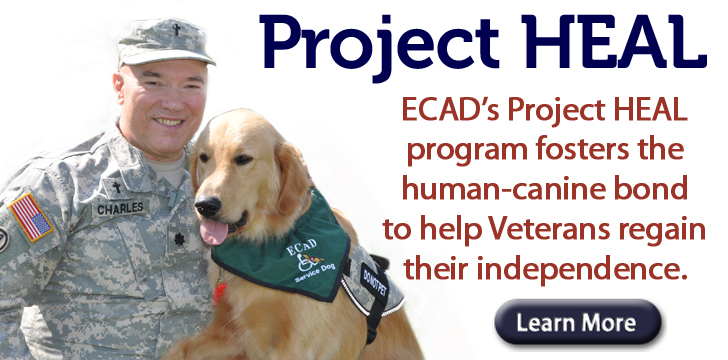Open Doors
Since 1995, ECAD’s core program, Open Doors, has directly served the needs of over 300 disabled clients and has helped thousands of distressed individuals. Every Open Doors Assistance Dog receives two years of education to prepare them for their career. These purpose-bred, hand-raised dogs learn specific behaviors to serve people with physical needs or to support those in challenging circumstance with a wet-nose nuzzle, an extended paw, and a wagging tail.
Variety of Assistance Dogs ECAD Places:
Service Dogs
A dog that works for individuals with disabilities other than blind or deaf. They are trained to perform a wide variety of tasks including but not limited to; pulling a wheelchair, bracing, retrieving, alerting to a medical crisis, and providing assistance in a medical crisis. Some of these disabilities include but are not limited to Multiple Sclerosis, Parkinson's Disease, Sleep Apnea, Friedreich's Ataxia, Vertigo, Cerebral Palsy, Muscular Dystrophy, and Spinal Cord Injuries
Apply for a Service Dog | Request for More Information
Skilled Companion Dogs
A service dog trained to work or perform tasks with an adult or child with a disability under the guidance of an additional person, a facilitator. A facilitator is typically a parent, spouse or caregiver who handles and cares for the assistance dog, encourages and is responsible for the customized needs of the placement.
Apply for a Service Dog | Request for More Information
Eligibility:
The applicant must:
- Be in need of a Service Dog to assist in activities of daily living due to some type of a physical restriction.
- Be willing and able to travel to our Connecticut training center for interviews, Team Training and yearly public access tests.
- Have an acceptance of his or her physical disability.
- Demonstrate they can put into practice the information they have learned during Team Training.
- Develop a bond with their Service Dog and perform safely as a Team in public.
- Have the ability to commit to uphold the training for the life of the dog.
- Must be able to show that he or she has the appropriate environment and resources to properly care for a dog.
Education:
All participants are required to complete a thirteen-day Team Training, where they are taught commands, skills, and canine behavior through lectures, dog handling drills, and community field trips. During Team Training, attendees have the option to stay on-site in shared lodging.
Release Dogs
ECAD’s breeding program is specifically designed for the purpose of the dogs to be Assistant Dogs. There are rare and specific instances when our Service Dogs-in-Training may not be a good match for the type of service work that is needed by our clients. In the event that a dog has been “disqualified” from Assistance Dog work, we still want to provide it the love and care it deserves. These “Release Dogs” make great pets and companions for the right households. If you are interested in adopting a Release Dog please click the link below to access the application.
Why would a dog be released?
- Medical reasons: Unsatisfactory hip x-ray or eye exam, allergies, etc.
- Behavioral reasons: high energy/activity level, incompatible with other animals, assertiveness, unable to handle stress, inappropriate barking, not suitable for homes with children, fearful in public, and/or unable to adjust to change, etc.
How much does it cost to adopt an ECAD release dog?
- The price of a release dog is determined based on the age, amount of training received, and medical cost incurred by the organization. All dogs released from ECAD have been spayed/neutered, had their hips certified, received all their preventatives and vaccines, and have learned basic obedience skills. The fee helps ECAD to recover some the monies invested into a dog that will not be placed with a person living with a disability.
If you are interested in adopting a Release Dog please click here to access the application.
Service Dog Programs & Services
ECAD’s mission of providing highly skilled Service Dogs to increase mobility and independence for people living with disabilities manifests itself in a variety of programs and services. Each one designed to meet the needs of a specific population: Veterans, persons living with disabilities, children as young as two with Autism and facilities.
ECAD does not discriminate applicants on the basis of race, color, religion, sex (including pregnancy and gender identity), national origin, political affiliation, sexual orientation, marital status, genetic information, age, or other non-merit factor.
Core Programs:
-
Open Doors
ECAD’s core program whereby Assistance Dogs are educated to prepare them for a career as a Service or Facility Dog.
-
 What are Service Dogs?
What are Service Dogs?ECAD Service Dogs have helped over 300 disabled clients with over 50 different disabilities. Some of these disabilities include but are not limited to Multiple Sclerosis, Parkinson's Disease, Sleep Apnea, Friedreich's Ataxia, Vertigo, Cerebral Palsy, Muscular Dystrophy, and Spinal Cord Injuries.
-
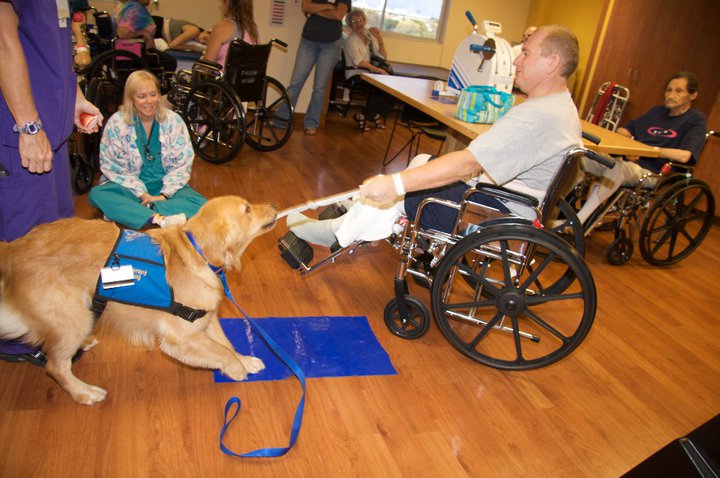 Facility Dogs
Facility DogsECAD Facility Dogs, who can be found in hospitals, nursing homes, courthouses, etc., have helped thousands of distressed individuals.
-
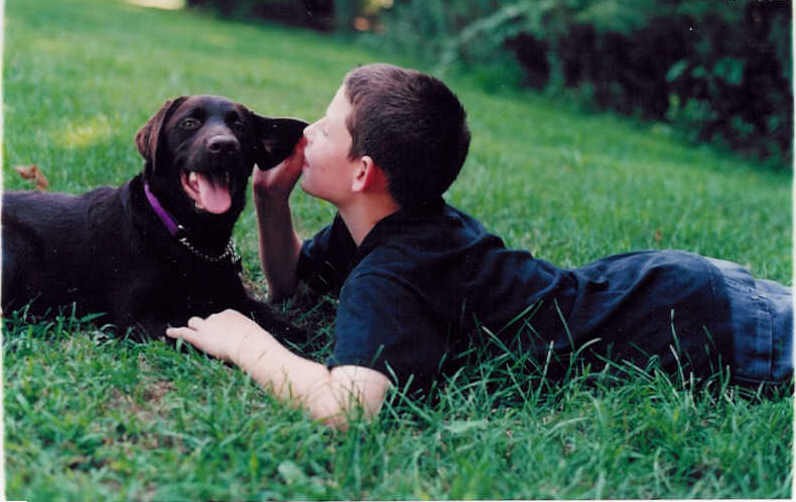
Canine Magic
Specially educated Service Dogs assist children with autism - some as young as two years old - to build emotional bonding, cognitive development, socialization, and safety.
-
 Project HEAL™
Project HEAL™Our Project HEAL program is designed to meet the needs of Veterans living with physical injuries, Post Traumatic Stress Disorder (PTSD), and/or Traumatic Brain Injury (TBI). Specifically educated Service Dogs help ward off panic attacks, provide a physical barrier in public places, and/or provide mobility and retrieval assistance.
Client’s Bill of Rights
ECAD (Educated Canines Assisting with Disabilities) provides specialized training for individuals with disabilities, preparing them and ECAD dogs for certification as Service Dog Teams. Upon acceptance as a client of ECAD, certain obligations must be met. The client’s goal in applying is to become an ECAD certified Team. In order to maintain the high standards required by ECAD, these expectations can be achieved only if the client fulfills their responsibilities. Read More
Additional Service:
Facility Dog
Facility Dogs are specially trained Service Dogs that work with a volunteer or professional who is trained by a program. The work of a facility dog can include visitations or professional therapy in one or more locations. Public access is permitted only when the dog and handler, who is a trained volunteer or professional, is directly working with a client with a disability. Our Facility Dogs, who can be found in hospitals, nursing homes, courthouses, etc., have helped thousands of distressed individuals.
Apply for a Facility Dog | Request for More Information
What is a Facility Service Dog?A Facility Dog is an Assistance Dog that is trained to work for an organization to assist many adults and/or children within the organization. These dogs, coupled with trained human handlers, enhance the quality of life for the people utilizing the services provided by the organization. They respond to specialty cues at the direction of their handler and must have a calm disposition and the ability to stay polite in different environments and situations. |
 |
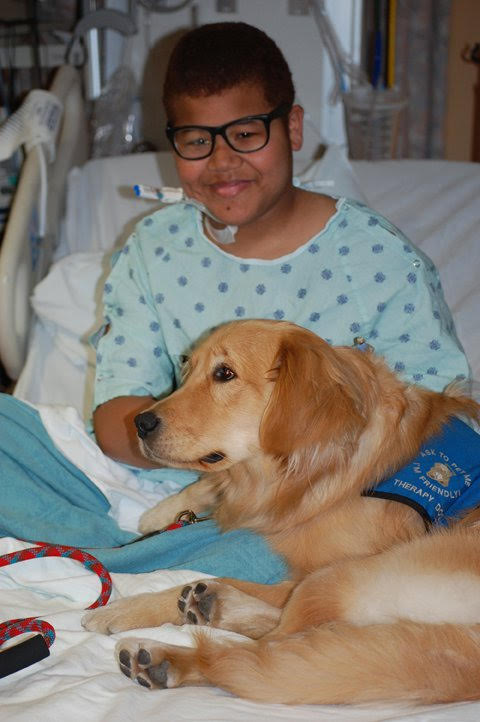 |
How do Facility Dogs Help?
|
Is a Facility Dog Right for My Organization?A Facility Dog might be just the right fit for your organization to provide wonderful benefits for your constituents. Here are some tips to help you know if your organization would be a good fit for a facility dog:
|
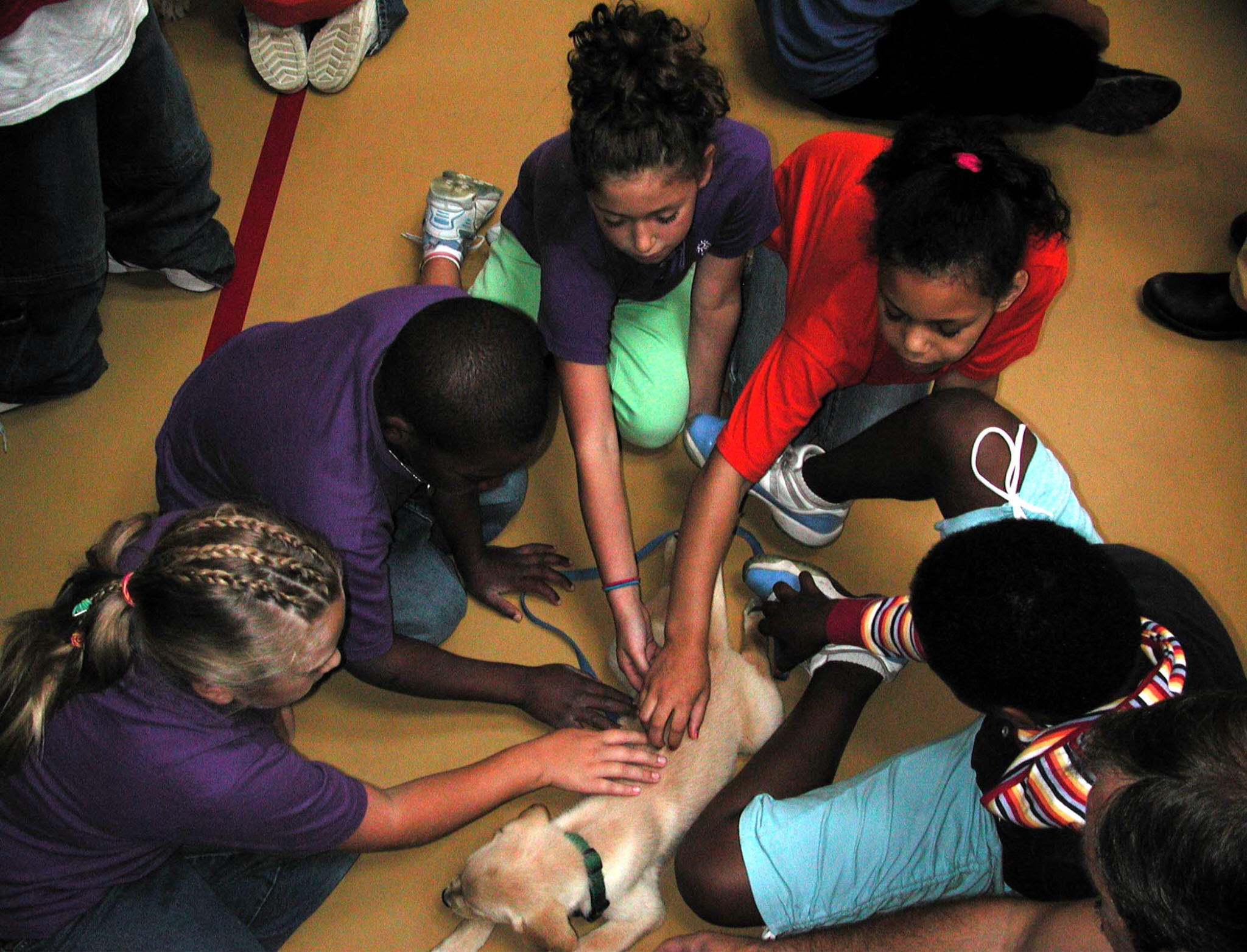 |
 |
The ECAD Difference & ProcessECAD is an Assistance Dogs International certified trainer of dedicated Service Dogs that support their human counterparts in a wide variety of situations. ECAD has trained and placed hundreds of Assistance Dogs, including many to facilities just like yours. Contact us to learn more about the many benefits a Facility Dog can have for your organization or Apply for a Facility Dog Here! Curious what the process of getting a Service Dog looks like in general? Check out our infographic: Acquiring a Service Dog. |
Help Us Reach Our Goal 
10%
ECAD, Educated Canines Assisting with Disabilities is a 501(c)(3) nonprofit organization and we depend on generosity of people like you to continue changing lives.
ECAD Volunteer Opportunities

There are many ways you can be a part of the miraculous process of turning tiny puppies into confident and mature Service Dogs.




